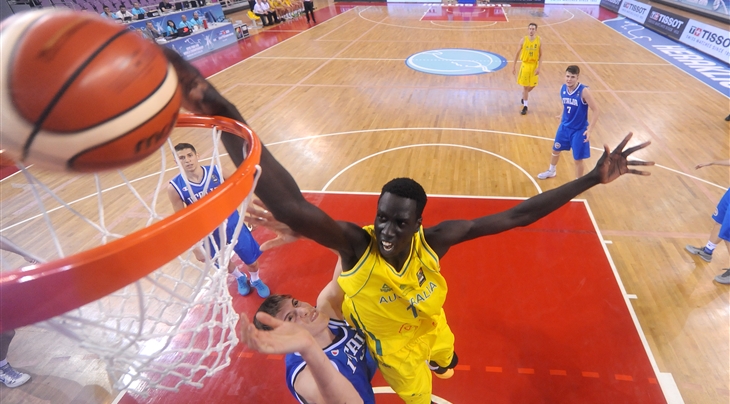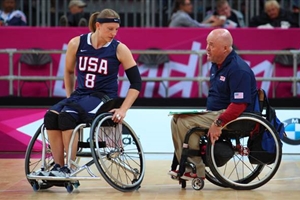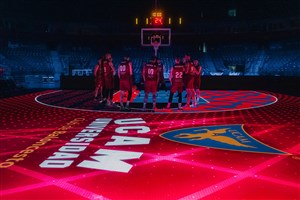
Looking deeper than the placings
MELBOURNE (Paulo Kennedy’s View from Downunder) - For some, the Emus finishing in seventh place at the FIBA U19 World Championship is cause for alarm, or even a reason for heads to roll.
In reality though, there's a lot more to be taken from how the team plays than simply where they place.
A classic example from this tournament was the Dominican Republic, whose 13th place finish would look like a real struggle.
But look at their actual results – single-figure losses to Serbia, Greece, Italy and Argentina, along with three double-figure victories over lesser opponents – and DR fans would have to be delighted with how competitive their young talent is globally.
Of course, things are a little different when judging established basketball countries like Australia, but given the junior Boomers have finished in the medal rounds in six of the past 10 underage world titles, there can be little concern for our country’s development programs.
Focusing in on this year’s event in Greece, the Emus were competitive with Canada, Spain, Turkey, Italy and Serbia, indicating the team was around the mark we would expect, even if they didn’t produce the results we hoped for.
Outback Gak?
Probably the most intriguing aspect of the Emus’ tournament was Deng Gak, who was quite simply dominant in the quarter-final against Turkey, controlling play at the defensive end with his athleticism, which also came in handy on the some impressive finishes 94 feet away.
Gak wasn’t really able to replicate that stunning form at any other point, but interestingly his +/- was positive in five of the seven games, including in two losses.
We saw the impact Ekene Ibekwe had for the New Zealand Breakers last NBL season with his ability to use length and athleticism, and certainly Gak has those attributes in spades.
No doubt he will attract plenty of interest from colleges, and there is a solid professional career waiting if he is prepared to do the hard work.
DJ selection?
Another player who will have to put in plenty of hours to reap the rewards is shooting guard Dejan Vasiljevic.
Some people have questioned his value to the Emus, pointing to him taking 13.6 field goals per game, four more than any other teammate, while shooting just 38 per cent, five per cent below the team average.
That is a valid point, but to focus only on that ignores the value DJ provided to this team.
Sure there were bad shots, but there were also tough makes at much-needed times, and other shots he created out of nothing when the offence was stagnant, sometimes creating offensive rebounding opportunities for teammates when a possession had seemed lost.
Vasiljevic also plays with a passion that is contagious, and that can’t be undervalued. So while his tournament was only average overall, there should be no questioning he had a place in the line-up.
DJ the pro?
But the story could be different when it comes to making it as a pro.
In a short tournament, a player who can turn a game in a moment is valuable, but over full seasons DJ’s poor shot selection, streaky shooting, lack of size for a shooting guard, lack of handles and speed for a point guard, and his overall unpredictability could count against him.
Across two junior world championships Vasiljevic has now shot 37 per cent on 208 shot attempts. What pro team wants a shooting guard with that sort of accuracy?
Of course, he is just 18 years of age, so there is plenty of time, and in that time he must figure out what his role should be, gain an understanding of what’s a good shot and a bad shot, and develop playmaking skills so he can offer clubs a sparkplug scoring point guard off the bench if need be.
Falling into a secondary trap?
I talked earlier about the Emus being competitive with some quality countries, but in four of those games they couldn’t produce the win.
One thing that hurt them was giving up easy points after teams had broken, or even just survived, the Emus’ trapping defence.
Following the template of Boomers coach Andrej Lemanis, the U19s actively disrupted opponents and did it very well at times, getting the tempo on their terms.
But concerning was the number of times the Emus successfully slowed an opponent, only to give up an open look from an overly exuberant trap or being slow to identify threats after retreating into half-court defence.
The former is something Lemanis was all-but able to iron out in his time with the Breakers, and something he has greatly reduced from the start of his stint as Boomers boss.
The latter is a challenge all Australian coaches implementing the mantra of defensive disruption must be wrestling with.
There is a natural tendency for players to drop the intensity when they call off the traps. Turkey and Italy exploited that in the U19 world champs by aggressively attacking off the dribble and confidently shooting any open shots.
Stop moment?
The key is what I call a ‘stop moment’.
That’s a point where, following traps which have drained the shot clock, the defence can create a second stage of delay which allows the help D to recover and get onto the front foot again, rather than spending 10 seconds on proactive defence before reacting and scrambling for the final 14 seconds.
Be that a force to the corner, denial on the wings, a trap before an on-ball is used to allow early rotation or something else, a ‘stop moment is about throwing the offensive team’s rhythm for a second time on a possession, just as they have regained their composure.
It’s easier said than done, but I think it’s the key to unleashing some different full-court and half-court looks – including Lemanis’ clever transition traps which debuted last international season – with greater confidence of not giving up too many easy scores.
Paulo Kennedy
FIBA
FIBA's columnists write on a wide range of topics relating to basketball that are of interest to them. The opinions they express are their own and in no way reflect those of FIBA.
FIBA takes no responsibility and gives no guarantees, warranties or representations, implied or otherwise, for the content or accuracy of the content and opinion expressed in the above article.


















